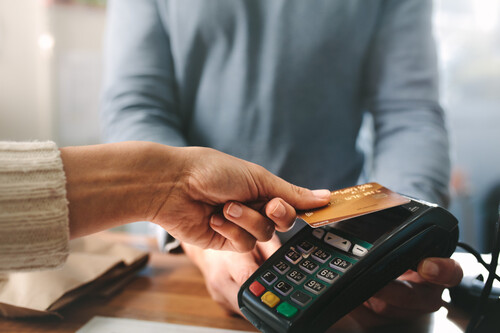Un paiement rapide et sécurisé
BNP Paribas doit lancer à l’automne une carte bancaire biométrique permettant à son détenteur de payer ses achats en positionnant son doigt à un point précis et donc sans avoir à taper son code secret. Le geste sera le même que celui utilisé pour le paiement sans contact à la différence que la transaction ne sera pas limitée à 50 euros. « La forme et la taille de la carte ne changent pas », explique la banque.
La carte biométrique, conçue par le spécialiste de l’électronique Thales, a déjà été testée. Plusieurs projets pilotes ont été menés en Suisse, au Royaume-Uni, à Chypre ou encore au Liban. BNP Paribas affirme que les paiements effectués par son biais seront très sécurisés, l’empreinte digitale étant propre à chaque individu.
Pour activer leur carte, les clients devront faire un premier paiement sur un terminal de paiement électronique avec saisie du code confidentiel. Dès sa réception, ils recevront également un boîtier métallique permettant d’enregistrer leur empreinte digitale.
Entre 10 000 et 15 000 cartes biométriques déployées
À l’automne, BNP Paribas devrait livrer entre 10 000 et 15 000 cartes bancaires biométriques aux détenteurs de cartes Gold ou Premier. En revanche, leur prix reste pour l’heure inconnu.
BNP Paribas n’est pas la seule banque à s’être lancée dans un tel projet. Fin 2018, Société Générale a lancé un projet pilote de carte biométrique intégrant un capteur d’empreinte digitale. Quelques mois plus tard, en juin 2019, Crédit Agricole a, à son tour, évalué ce système de paiement auprès de 200 personnes en vue d’une commercialisation cette année.
Les Français plutôt confiants
L’utilisation de l’empreinte digitale à la place du code PIN semble préférée par les Français. Effectivement, selon un sondage mené par le réseau Visa, 79 % des utilisateurs considèrent que « les solutions biométriques offrent un moyen sûr d’authentification ». Le Groupement des Cartes Bancaires CB ajoute que 52 % préfèreraient utiliser leur empreinte digitale plutôt que leur code confidentiel pour régler leurs achats.
Ainsi, la carte biométrique semble receler un réel potentiel commercial. Les banques ont tout intérêt à saisir cette opportunité pour tenter de rattraper leur retard par rapport au paiement mobile et conserver la relation directe avec le client. La carte biométrique présente également l’avantage de réduire les manipulations chez les commerçants, un véritable atout dans le contexte de crise sanitaire actuel. En effet, le paiement sans contact est désormais privilégié par les consommateurs pour limiter les risques de contaminations.
